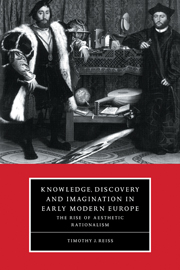Book contents
- Frontmatter
- Contents
- Prologue and acknowledgements
- A note on the text
- Introduction
- Part 1 Problematizing the language arts
- Part 2 Passages
- 3 Rhetoric and politics
- 4 Method and knowledge
- Part 3 Mathematics, music and rational aesthetics
- Bibliography
- Index
- CAMBRIDGE STUDIES IN RENAISSANCE LITERATURE AND CULTURE
4 - Method and knowledge
Published online by Cambridge University Press: 01 February 2010
- Frontmatter
- Contents
- Prologue and acknowledgements
- A note on the text
- Introduction
- Part 1 Problematizing the language arts
- Part 2 Passages
- 3 Rhetoric and politics
- 4 Method and knowledge
- Part 3 Mathematics, music and rational aesthetics
- Bibliography
- Index
- CAMBRIDGE STUDIES IN RENAISSANCE LITERATURE AND CULTURE
Summary
Estienne still worried in 1562 that if words lost their meanings, however conventionally established, the processes of language and learning became nonsense, decaying into madness:
Similar absurdity (indeed, even more) is found in certain other locutions, which nonetheless please many, and for no other reason than that they are spoken against all reason. And it is the case that if this idiotic (indeed, insane) desire for novelty continues to gain ground, overturning everything wherever it goes, I fear that in the end we will have to call head foot and foot head. Especially will this be so once such a desire has entered the heads of ignorant people, be they courtiers or others.
He tied this unreason directly to political conditions, arguing that bringing Machiavellian political practices into France had fatally undermined linguistic, and so conceptual, sureties. He blamed the matter on those who frequented the Medici-controlled court, and in this we may well see a continuation of that path of civic humanism to which I have already several times referred.
Like most others in France, as religious disturbances in the 1540s and fifties became increasingly vicious civil dynastic wars in the 1560s and seventies, Estienne grew warmer on the subject. By 1575, he had joined the Protestant polemicist Innocent Gentillet in directly attacking the queen: Discours merveilleux de la vie, actions & deportemens de Catherine de Medicis royne mere.
- Type
- Chapter
- Information
- Knowledge, Discovery and Imagination in Early Modern EuropeThe Rise of Aesthetic Rationalism, pp. 101 - 132Publisher: Cambridge University PressPrint publication year: 1997



